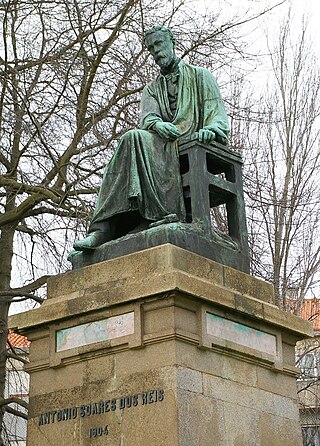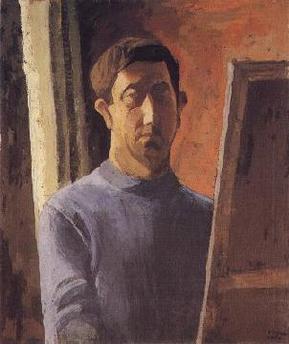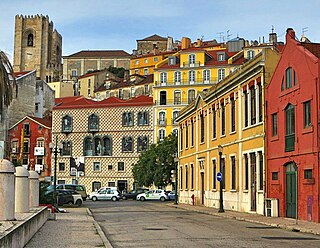Related Research Articles

Domingos António de Sequeira was a famous Portuguese painter at the Royal Court of King John VI of Portugal.

The Palace of Ajuda is a neoclassical monument in the civil parish of Ajuda in the city of Lisbon, central Portugal. Built on the site of a temporary wooden building constructed to house the royal family after the 1755 earthquake and tsunami, it was originally begun by architect Manuel Caetano de Sousa, who planned a late Baroque-Rococo building. Later, it was entrusted to José da Costa e Silva and Francisco Xavier Fabri, who planned a magnificent building in the neoclassical style.

Columbano Bordalo Pinheiro, who is usually referred to as Columbano, was a Portuguese Realist painter. Usually considered the greatest Portuguese painter of the 19th century, he has been compared to the likes of Wilhelm Leibl and John Singer Sargent.

Soares dos Reis National Museum is a museum, currently housed in the Carrancas Palace situated in the civil parish of Cedofeita, Santo Ildefonso, Sé, Miragaia, São Nicolau e Vitória, in the northern Portuguese city of Porto.

The National Museum of Contemporary Art of Chiado is an art museum located in the Chiado neighbourhood of Lisbon, Portugal. It was created in 1911 and re-inaugurated, in new installations, in 1994.

António Manuel Soares dos Reis was a Portuguese sculptor.

The Museu Nacional de Arte Antiga, also known in English as the National Museum of Ancient Art, is a Portuguese national art museum located in Lisbon. With over 40,000 items spanning a vast collection of painting, sculpture, goldware, furniture, textiles, ceramics, and prints, MNAA is one of the most visited museums in Portugal.

João Manuel Navarro Hogan was a Portuguese painter and printmaker.
Cristóvão de Figueiredo was a Portuguese Renaissance painter.

Pedro Cabrita Reis is one of the foremost visual artists of his generation and also one of Portugal’s most internationally renowned artists. His work features a wide variety of media – painting, sculpture, photography and drawing – and has been exhibited and included in numerous national and international museum collections. He lives and works in Lisbon.

The Palace of the Carrancas is a former-residence in the civil parish of Cedofeita, Santo Ildefonso, Sé, Miragaia, São Nicolau e Vitória, in the northern Portuguese city of Porto. It houses the Soares dos Reis National Museum.

Francisco Tropa is a Portuguese sculptor and visual artist. He lives and works in Lisbon.

Visiting only by booking, the Casa Museu Fernando de Castro is a historical house, located in the city of Porto, Portugal, that belonged to Fernando de Castro, a Portuguese poet, caricaturist, merchant and collector. It contains several paintings from the 17th to the 20th century, sculptures and ceramic pieces. The museum is now under administration of the Soares dos Reis National Museum.

Adriano Sousa Lopes was a Portuguese Modernist painter and engraver who worked in a wide range of genres.

Lisbon is one of the most popular city destinations in Europe. The city of Lisbon and the Lisbon metropolitan area attracts a significant number of tourists each year, drawn to its historical and cultural heritage, good transportation connections and good touristic infrastructure.

Mónica de Miranda is a Portuguese visual artist, photographer, filmmaker, and researcher of Angolan ancestry known for her artwork on socially inspired themes, including postcolonial issues of geography, history, and subjectivity related to Africa and its diaspora. Her media include photography, mixed media and video. De Miranda first became known for her photographic records of the ruins of modern hotels in post-war Angola, and their surrounding sociopolitical circumstances. Her photographic series, videos, short films, and installations have been internationally exhibited at art biennales, galleries, and museums, some of which keep her work in their permanent art collections. Her work has been reviewed in specialized art sources.

Gianmarco Donaggio is an Italian experimental film director and cinematographer.

Museu Allen, also referred to as the Museu da Restauração and the Museu Portuense da Rua da Restauração, was located in the parish of Miragaia, in the city and district of Porto, in Portugal. The first museum in Porto to offer public admission, it was dedicated to the exhibition of collections of art, natural history, epigraphs and other items owned by John Francis Allen (1781-1848), a wealthy port wine dealer, whose collection was, at the time, considered the best private collection in the country.
References
- ↑ "short film 'Azul no Azul' (Blue in Blue)". MUSEU NACIONAL DE ARTE CONTEMPORÂNEA DO CHIADO. Retrieved 2022-10-16.
- 1 2 Bordino, Margherita (2022-08-11). "Azul no Azul: il corto dedicato al Museo MNAC di Lisbona" (in Italian). Retrieved 2022-10-16.
- ↑ CMP (2022-12-09). "Exposição | "Azul no Azul"- 150 anos de "O Desterrado"". www.porto.pt (in Portuguese). Retrieved 2024-01-24.
- ↑ "Museu Nacional de Soares dos Reis assinala 150 anos de "O Desterrado"". www.dn.pt (in European Portuguese). Retrieved 2022-12-08.
- ↑ "Museu Nacional de Soares dos Reis assinala 150 anos de "O Desterrado"". Jornal Expresso (in European Portuguese). 7 December 2022. Retrieved 2022-12-08.
- ↑ Frigerio, Simona (2023-11-24). "Anima Mundi Pax". IN THE NET (in Italian). Retrieved 2024-01-24.
- ↑ Lusa, Agência. "Museu Nacional de Soares dos Reis assinala 150 anos de "O Desterrado"". Observador (in European Portuguese). Retrieved 2024-01-24.
- ↑ "Azul no Azul". Museu Nacional Soares dos Reis (in European Portuguese). Retrieved 2024-01-24.
- ↑ "Gianmarco Donaggio".
- ↑ "Azul no Azul".
- 1 2 "Painting rarefied the spirit". MUSEU NACIONAL DE ARTE CONTEMPORÂNEA DO CHIADO. Archived from the original on 2022-10-16. Retrieved 2022-10-16.
- ↑ "Azul no Azul, a Lisbona il nuovo lavoro del regista varesino Gianmarco Donaggio". VareseNews (in Italian). 2022-07-19. Retrieved 2022-10-16.
- ↑ "Jovem da Maceira convidado a pintar quadros para príncipe saudita". Jornal de Leiria (in Portuguese). Retrieved 2022-10-16.